Exploring the mysteries of the cellular pathways to fibrosis
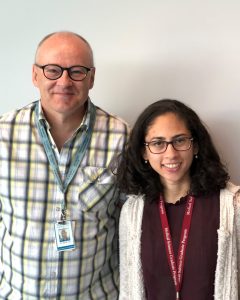
A recently completed study by Dr. Kjetil Ask and PhD student Olivia Mekhael sheds new light on how certain cells in the circulatory system make their way into the lungs and activate scar-producing cells, creating fibrotic tissue in the lungs.
Conducted at McMaster University, the study began with mice models and expanded to the exploration of cellular pathways in archived human lung tissue samples, taken from patients during the process of diagnosis. Patient blood samples were also used. McMaster has one of the largest human lung tissue banks with between 300 and 400 classified samples, according to Dr. Ask, Associate Professor at the University and with the Firestone Institute for Respiratory Health.
“What we found was similar in both the mice studies and our analysis of the human lung tissue and blood,” says Ask. “In simple terms, specific cells, originating in the bone marrow, travel through the bloodstream and enter the lungs, where they activate scar-producing cells and contribute to the progressive nature of fibrotic disease.”
They found that the cells which activate scar-producing cells were more prevalent in the IPF lung tissues than in the normal control lung tissues. They occurred at different levels, but they were more abundant than in the control lung tissues. They also found that the pre-cursor to these activation cells was present at higher levels in the blood of people with IPF, than in people without IPF.
How can this study, in part funded by a $20,000 CPFF research grant in 2018-2019, inform future research and ultimately help people living with pulmonary fibrosis? “What we have learned from this study is that it’s all about location, location, location,” says Dr. Ask. “The right delivery of a medication, through the bloodstream or directly into the lungs, may target different processes that all contribute to the progressive nature of the disease, and in the end block the fibrotic process ongoing in the lung. Finding the right targets and the right delivery route of medications aimed to stop the different cells and molecular processes involved in the progression of the disease may give rise to more combination therapies, targeting different biological processes.”
A critical part of any research is the sharing of results. Olivia Mekhael, who did most of the study’s analysis, prepared a poster for several conferences, which also published abstracts of the study. She is set to submit her manuscript in the next few weeks, for peer review by experts in the field, and publication.
She presented the poster at several conferences, including: the American Thoracic Society, May 2019; the Canadian Connective Tissue conference, June 2019; Research Day at McMaster, at which she won an award for her poster; and an Immunology conference at McMaster. The CPFF logo appeared on her poster as a supporter of the research.
Mekhael appreciates the funding that was received from CPFF. “It enabled us to expand our research beyond mouse models into an examination of human lung tissue,” she says, “A critical step in determining the relevance of our work to people living with pulmonary fibrosis, and continuing research in this area.”
In addition, the study results, communicated in her poster and in publication, will make her subsequent applications to other funding organizations much more competitive.
Mekhael also appreciated being able to meet people with pulmonary fibrosis in the clinic at the Firestone Institute for Respiratory Health. It helped her become familiar with the IPF diagnosis and its impact on people.
“It was a very satisfying component to what can be solitary work. It is inspiring and motivating to meet people living with the disease.”
Next semester, Mekhael will also be preparing a video presentation of her work for the McMaster Demystifying Medicine Seminar Series. We will let you know when it is available for viewing. The Demystifying Medicine YouTube channel has had more than 8 million views since it began in 2012.
“The program, co-designed by students, helps us increase our communication skills as we work in small teams where we try to generate creative, efficient educational videos aimed at various audiences ranging from very young kids to specific patient populations. It also helps us understand what is important, as we very often work together with the different patient organizations or with local high schools,” says Dr. Ask.
“We feel that through this work, we not only improve our communication skills, we also end up with a better understanding of the science itself. The program also fosters life-long learning skills such as risk-taking, the ability to learn from failure, problem-solving, team-work and creativity, which are skills we value very highly,” says Dr. Ask. The video archives educational material related to IPF can be found here.
Living with Pulmonary Fibrosis and Staying Positive with Every Breath©
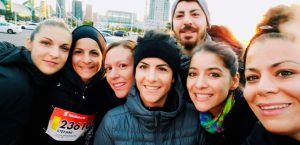
On Sunday, October 20, you are invited to participate in the Scotiabank Charity Challenge to be held along Toronto’s waterfront. The waterfront marathon event, which includes a five-kilometre walk option, allows participants to raise funds for their favorite charity. Canadian Pulmonary Fibrosis Foundation is a registered charity for the event.
There are several ways you can help raise funds for CPFF through the Charity Challenge, from anywhere in Canada.
You can visit the CPFF page on the Scotiabank Toronto Waterfront Marathon website and make a donation. Ask your friends to do the same.
If you want to make a donation to an individual or team that is participating in the Charity Challenge in support of CPFF, you can sponsor them.
- Visit the CPFF fundraising page on the Charity Challenge website.
- Select the SEARCH field in the top right of your screen
- Enter the name of the individual or team and make your donation!
 Sharon Lee, CPFF Executive Director, will be walking in memory of CPFF Founder Robert Davidson, who passed away this past May, as well for all of those who are no longer with us, but remain with us all in spirit. You can make a donation on her Charity Challenge page here.
Sharon Lee, CPFF Executive Director, will be walking in memory of CPFF Founder Robert Davidson, who passed away this past May, as well for all of those who are no longer with us, but remain with us all in spirit. You can make a donation on her Charity Challenge page here.
If you live in the Toronto area, you can register and participate in the event and ask your family, friends, neighbours and colleagues to join you or sponsor you. As a charity registered with the event, CPFF can offer you discounts on the registration fees. You need to enter the CPFF customized discount charity PIN codes as follows:
- Marathon or Half Marathon ($80): M19CPFF
- 5k ($40): 5K19CPFF
- 5k with Stroller ($45): 5ST19CPFF
Where do you enter the Charity PIN code?
- Go to Race Registration
- Complete the personal information section as a Canadian runner
- *DO NOT* enter the Pin Code into the Promo Code field
- Select Yes to I would like to participate in the Scotiabank Charity Challenge
- Select Your Charity from the drop-down menu
- Enter your Charity Pin Code into the Charity Pin Code field
It’s time to contact your federal candidates

The federal election is now well underway. It is the perfect time to get in touch with your local candidates – all of them – to ask how they are going to support people living with pulmonary fibrosis?
Regardless of the outcome, this is an excellent opportunity to ensure the next government has some background about pulmonary fibrosis, the challenges faced by our community, and how government can help. This will help improve our access to MPs, both the newly elected and returning members.
We urge you to communicate our concerns and recommendations to all candidates in your riding. As a voter, they should be listening, especially during the campaign. To make it easier, you can adapt our sample email to send to your local candidates.
We want to know if they will support a national pharmacare plan, to improved access to essential pulmonary fibrosis drugs, especially for those with no current drug coverage. We also want to urge candidates to support physician education to improve the chances of an accurate diagnosis – much earlier. An earlier, accurate diagnosis and earlier access to specialists and the correct treatment, means a better quality of life for a longer time, for people living with pulmonary fibrosis.
We want candidates to consider how to address the current inequalities in access to life-saving oxygen? For those who struggle to breathe, access to oxygen and its delivery is critical, including timely access to ambulatory and personalized home oxygen services.
Finally, we want the next government to commit to increased funding for IPF research to a level that reflects the considerable and growing impact of the disease in Canada.
Now is your chance to be heard. As part of the Canadian pulmonary fibrosis community, your voice adds to the volume of our cause, making it harder to ignore.
Send your email to candidates today. Please copy [email protected] on your email and forward to her any responses you receive. (This will help with future CPFF advocacy efforts with elected candidates.)
Note: Although most health care and post-secondary education spending is determined by provincial governments, the federal government does set many national health care and post-secondary education policies, which provinces and territories must adhere to in order to receive federal funding. It should also have a coordinating role, ensuring equal access to quality health care, for all Canadians regardless of where they live in the country. Finally, the federal government is a large funder of health-related data collection and research.
Thank you for making PF Awareness Month great!
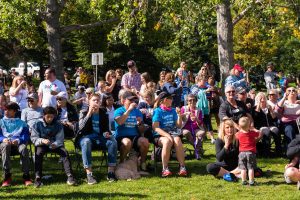
To the hundreds of people across the country who helped show people with pulmonary fibrosis and their families that they are not alone, we say thank you! Volunteers, health care professionals, staff, elected officials, public servants and media representatives as well as friends, colleagues and communities devoted their time, energy and talents to make the most of 2019 Pulmonary Fibrosis Awareness Month this September.
Thank you to everyone who blew bubbles, helped out at an event, attended or presented at an education session, arranged for a flag raising, proclamation or the lighting of a landmark, shared their story, organized an activity, or made a donation. Your actions make a difference to the 30,000 Canadians living with pulmonary fibrosis.
And to those with the disease who participated, thank you for facing the challenges you do everyday and offering hope for others and the future.
Many of you shared photos from your efforts and events. You can see them in the 2019 Pulmonary Fibrosis Awareness Month Photo Gallery. If you have additional photos, please send them to [email protected] and we’ll add them to the Gallery.
You can also read or listen to some of the media coverage from September 2019.
Here is some more information about Awareness Month that you shared with us:
Blowing bubbles
Once again, many of you gathered together and blew bubbles for those who have trouble taking a breath. Thank you. Hopefully you shared your photos on the CPFF Facebook page and on your own social media accounts. You can see the photos of those who shared them with us, in our Photo Gallery. If you have a photo you’d like to share, please send it to [email protected] and we’ll add it to the Gallery.
The Clarke Walk for Pulmonary Fibrosis
More than 300 people turned out for the fourth annual rendition of this family-friendly event on September 15 in Calgary, which raised more than $40,000. Calgary Mayor Naheed Nenshi also stopped by to lend his support. You can watch Abbie Clarke, who started the Walk, address the crowd, here. The Walk garnered some impressive media coverage. In addition to the Clarke Walk photos in our photo gallery, you can find more photos and information about the Walk here. You can still make a donation to the Clarke Walk here.
Education events
Education events took place in Stratford, PEI; Edmonton, Alberta; and Burnaby, British Columbia during Pulmonary Fibrosis Awareness Month. All three events were well attended, although many chose to attend the Edmonton event from home, since its program was also available online.
Special guests included MLAs Cory Deagle and Michele Beaton and Minister of Health James Aylward at the PEI event. In Edmonton, MP Ziad Aboultaif and MLA David Shepherd were in attendance. Burnaby Mayor Mike Hurley was on hand to declare September as Pulmonary Fibrosis Awareness Month at the education event held in his city. Photos of all three events can be found here.
Proclamations, flag raisings and landmark lighting
In Charlottetown, PEI, the local support group made arrangements for a symbolic flag raising event at the Lieutenant Governor’s residence, with September being proclaimed Pulmonary Fibrosis Awareness Month. In Newfoundland, St. John’s and Mount Pearl City Councils proclaimed Awareness Month too. Vancouver, Burnaby, Edmonton, Calgary, Markham and Toronto also made proclamations declaring September Pulmonary Fibrosis Awareness Month.
Several landmarks across the country agreed to shine the light on pulmonary fibrosis by lighting up buildings and signs in the CPFF colours of red and blue during September. These included: BC Place, the Calgary Tower, the CN Tower, the Toronto sign at Nathan Phillips Square and the Toronto City Hall, Mississauga City Hall, the Hamilton City Hall sign and the Niagara Falls sign.
Check out the photos in our 2019 Pulmonary Fibrosis Awareness Month Photo Gallery and on the CPFF Facebook page.
Corporate grant helps fund Calgary research study
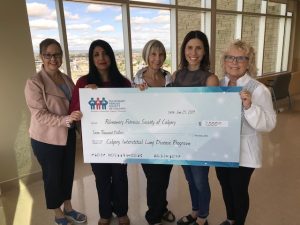
On May 14, 2019 the Pulmonary Fibrosis Society of Calgary (PFSC) was the recipient of a
$6,700 grant presented by RANA Respiratory Care Group. PFSC is honored to have
been selected as a recipient of the RANA Award and extends a special thank you to
RANA and all their employees for their amazing generosity. This gift will be used locally for a research project that will benefit those with pulmonary fibrosis.
In 2018, RANA created a robust corporate giving program, which engaged employees
directly. It’s part of the company’s strong belief that volunteerism supports employee
well-being and engagement with the joy of giving. RANA’s award is unique in that employees nominate organizations they believe to be worthy of a donation. Recipients
included Pulmonary Fibrosis Society of Calgary; Canadian Mental Health Association
Regina and Winnipeg Main Street Project. RANA trusts that their contributions will
support important work being done in our communities and that together we are helping
people live their best lives.
Dr. Kerri Johannson of the University of Calgary ILD Program, will be investigating the clinical outcomes of patients whose interstitial lung disease (ILD) was found during CT screening for lung cancer. “We will identify patients who were found to have ILD during their involvement in a lung cancer screening study underway in Alberta,” says Dr. Johannson. The research project will involve reviewing the charts of the identified patients for up to two years to see how many of them were actually referred to a lung specialist or the ILD program. The study will inform how many were referred, got a specific diagnosis and were started on treatment after their ILD was found on the CT scan. Understanding this pathway will be important as lung cancer screening programs roll out across Canada, potentially identifying individuals with otherwise unrecognized ILD.
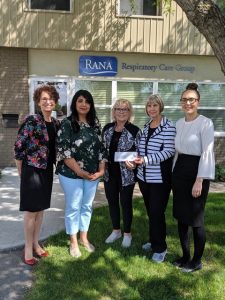
“The results of this study will help us determine how best to help patients who are
diagnosed with pulmonary fibrosis during screening for lung cancer,” says Dr. Charlene
Fell, Chair of the Canadian Pulmonary Fibrosis Foundation (CPFF) Medical Advisory
Board and Director of the University of Calgary ILD Program. “This includes planning
resources for pulmonary fibrosis clinics when lung cancer screening programs are
rolled out in the future.”
PFSC is pleased to be able to use the funds to support ILD research, in keeping with CPFF research funding guidelines. PFSC is a small group of dedicated volunteers who support pulmonary fibrosis patients, their loved ones and others affected by the disease through awareness, education, support and research. The group organizes public awareness booths at hospitals and health conferences; makes presentations to medical staff and students; fundraises, distributes information; takes part in Pulmonary Fibrosis Awareness Month activities in September and connects with other volunteer organizations and the community.
CPFF Board thanks Stephen Binch for his contributions
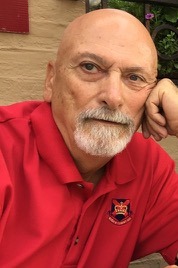
Last month Director Stephen Binch stepped down from the CPFF Board of Directors. The Board wishes to thank him for his many years of devoted service, especially as an advocate for people living with pulmonary fibrosis and as an advisor to several CPFF support groups in Ontario.
During his time on the Board, Stephen helped other volunteers establish new support groups in Niagara-on-the-Lake and in London, Ontario. Stephen will remain as the leader of the Hamilton Support Group.
With a background in the policing community for more than 30 years, Stephen has served on a number of boards. Prior to being diagnosed with IPF, he was a long-distance cyclist and competitive tournament golfer.
The Board will formally recognize his contributions at a reception planned for MPPs at Queen’s Park in December.


